Agriculture
AU CAADP BR3: Nigeria to improve on Agric. Policies, Financing
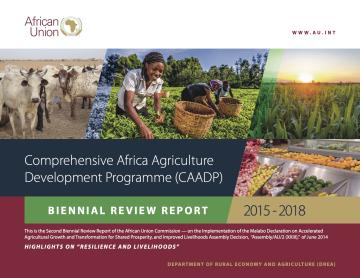
From: Friday Idachaba
As the Third Biennial Review of the African Union (AU) Comprehensive Africa Agriculture Development (CAADP) comes up later this month, Nigeria and other African Countries are expected to improve on their implementation of their Malabo 2014 Declarations.
Arising from the the Maputo and Malabo summits of 2003 and 2014, a declaration was signed by the African Heads of States undertaking to implement a seven-point agenda including allocation of 10 per cent of their national annual budgets to the Agriculture sector.
The focus was to support at least, six per cent growth rate for the sector as encapsulated in the CAADP framework to improve food security, nutrition, and increase incomes in Africa’s largely farming-based economies with emphasis on the seven thematic areas.
The area include recommitment to Principles and Values of CAADP Process; Enhanced investment in Agriculture with 10 per cent spending target; Ending hunger by 2025; Halving poverty by 2025; Boosting inter African trade; Enhancing resilience of livelihoods and Mutual accountability to actions and results.
The first and second reviews however indicated that a lot of African Countries including Nigeria, were not on track in most of the thematic areas hence the need for enhanced awareness and sensitization of stakeholders and duty bearers.
It was against this backdrop that ActionAid Nigeria in collaboration with other Civil Society Organisations (CSOs) organised a two-day Pre-BR3 Launch Event titled, “Strengthening Accountability and Utilisation Biennial Preview Results – Count Down to BR3 Launch” in Abuja.
The pre-launch meeting was attended by Media professionals in the Agriculture sector, CSOs and Small-scale Women Farmers Organisation in Nigeria (SWOFON) for sensitisation of stakeholders towards the launch at the AU Summit of African Heads of States in Addis-Ababa, this month.
Mrs Constance Okeke, International Project Manager for Scaling up Investments in Agriculture, ActionAid Nigeria, speaking on the approaching BR-3 launch described it as an accountability process instituted to help measure the progress of CAADP implementation in all the African countries.
“Every two years, a review is done to see how the programme is being implemented and countries data are submitted to the African economic regional economic communities who in turn submits to the African Union.
“They are analysed and prepared as form of report to Heads of States during their summit at the beginning of the year.
This is the 3rd Biennial Review. It started in 2017 with the first report released in 2018 summit and the second BR for 2019 was submitted at the African Heads of States summit in 2020.
“The idea of having this event is to join forces and resources to ensure that one of the primary key stakeholders in the agricultural development which is the Media is at the forefront of these issues.
“Because they will also help push information accurately, push accountability processes across board so that we all have the shared prosperity and improved livelihood that the Malabo and CAADP goal is set to achieve by 2025.
“We expect the media to go out there to tell the world and the continent, why it is important that we should focus on agricultural transformation.
“By putting more resources, by making sure we have policies and programs that will make sure that everybody is food secured and we all have the shared prosperity that we all look for”, she said.
On the achievements of the first and second Biennial Reviews, the ActionAid Project Manager said there had been a lot of achievement but there was still enough room for improvement.
“For example, African Heads of States agreed that they would commit 10 per cent of their annual national budgets to Agriculture but we know that most countries are not doing that.
“Nigeria is working towards achieving results and from what we saw, they have made a huge progress from the first BR to the second BR we are also hoping that the third BR will be better.
“We want more investments in agriculture, better policies, participatory processes, joint stakeholders review of programmes and policies so that we can be on the same page and everybody can move at the same pace. (Ends)
Agriculture
Ododo Kicks off wet season farming in Kogi, gives youth, women priority
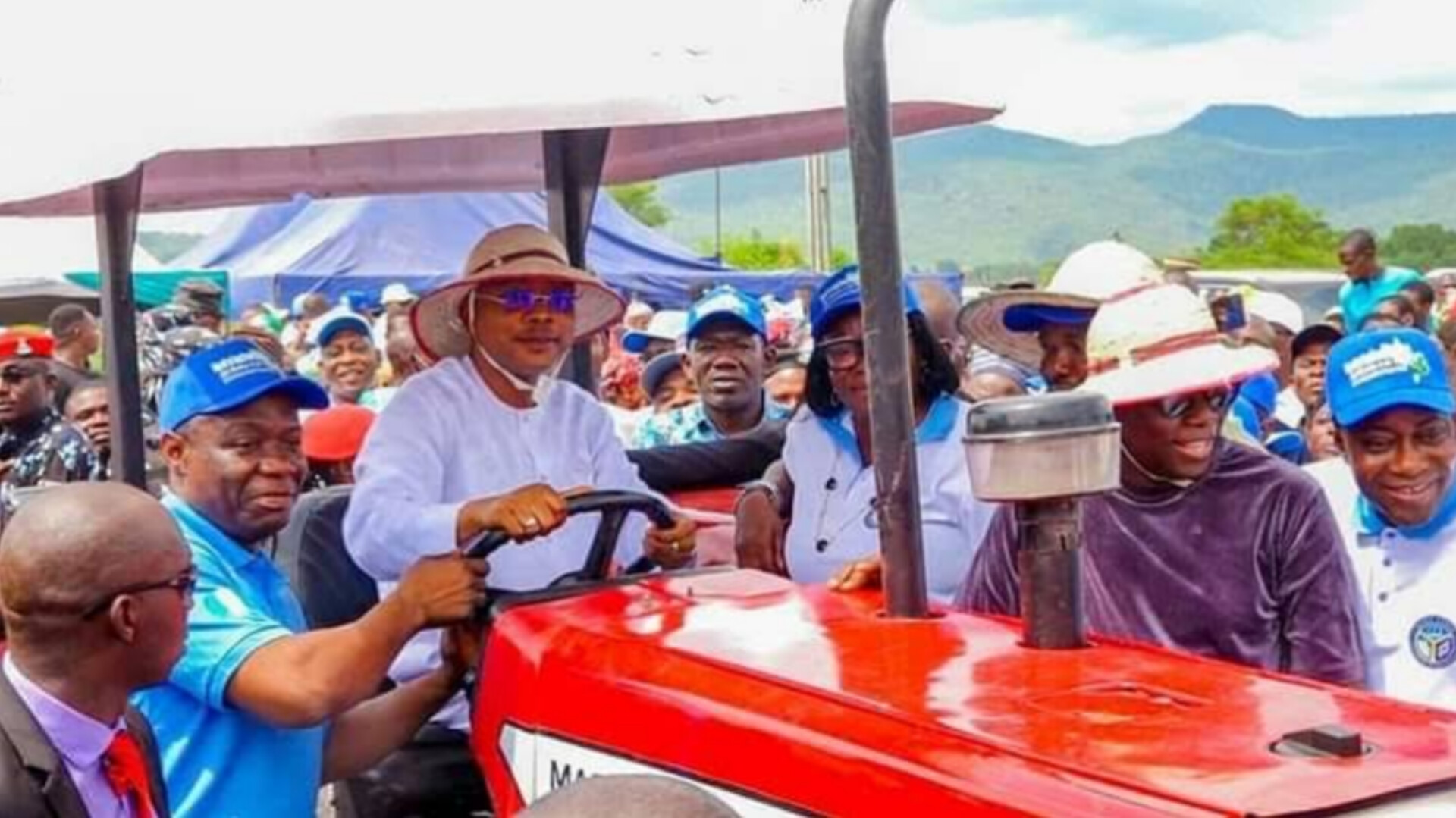
Governor Ahmed Usman Ododo of Kogi State has officially kicked off the 2024 wet season farming in the state with the presentation of over 100 tractors to serve about 10,000 farmers in different farming communities across the 21 local government areas in the state.
Special Adviser on Media to the Governor, Ismaila Isah in a statement quoted the Governor to have indicated at the flag off at Ajaokuta local government area of the state that investment in agriculture is a critical step towards poverty eradication in the state
The Governor added that in this year’s farming season 75% of the land cleared for cultivation will be allocated to youth and women farmers.
The Governor who noted that over 90% of the land area in the state is arable, promised to make Kogi a leading state in agricultural production and contribute to the development of Nigeria’s economy.
According to him,
“Across the 21 local government areas of the state, we are opening farmlands and preparing more land for cultivation of crops like rice, maize, cassava, yam and other staple food crops and grains.
“We have also procured farm implements for full scale agricultural mechanization in line with our agenda to ensure food security in the state.
“ Our youth are beginning to embrace agriculture as a credible source of wealth creation and our women in agriculture are already on the field because of their belief in our commitment to transform the agricultural sector in the state.
“I call on wealthy Kogites at home and abroad to begin to explore the window of opportunities that abound in the agro industry.”
The Governor noted that the state government has invested over 7 Billion Naira in farm implements with over 100 tractors to cultivate 7,324 hectares by about 10,000 farmers across the 21 local government areas in the state in the current farming season.
Ododo commended President Bola Ahmed Tinubu for supporting the agricultural transformation initiatives in the country, assuring that his administration has keyed into the cardinal objectives of the Renewed Hope Agenda to ensure food security in all parts of the country.
In his remarks, the state Commissioner for Agriculture and Food Security, Honourable Timothy Ojoma noted that the commencement of the wet season farming across 79 farm clusters in the state is a significant step in the agricultural transformation agenda of the state by Governor Ododo.
Agriculture
Food Security: GAIN, AFAN ask states, LGs to give microgrants to smallhoder farmers
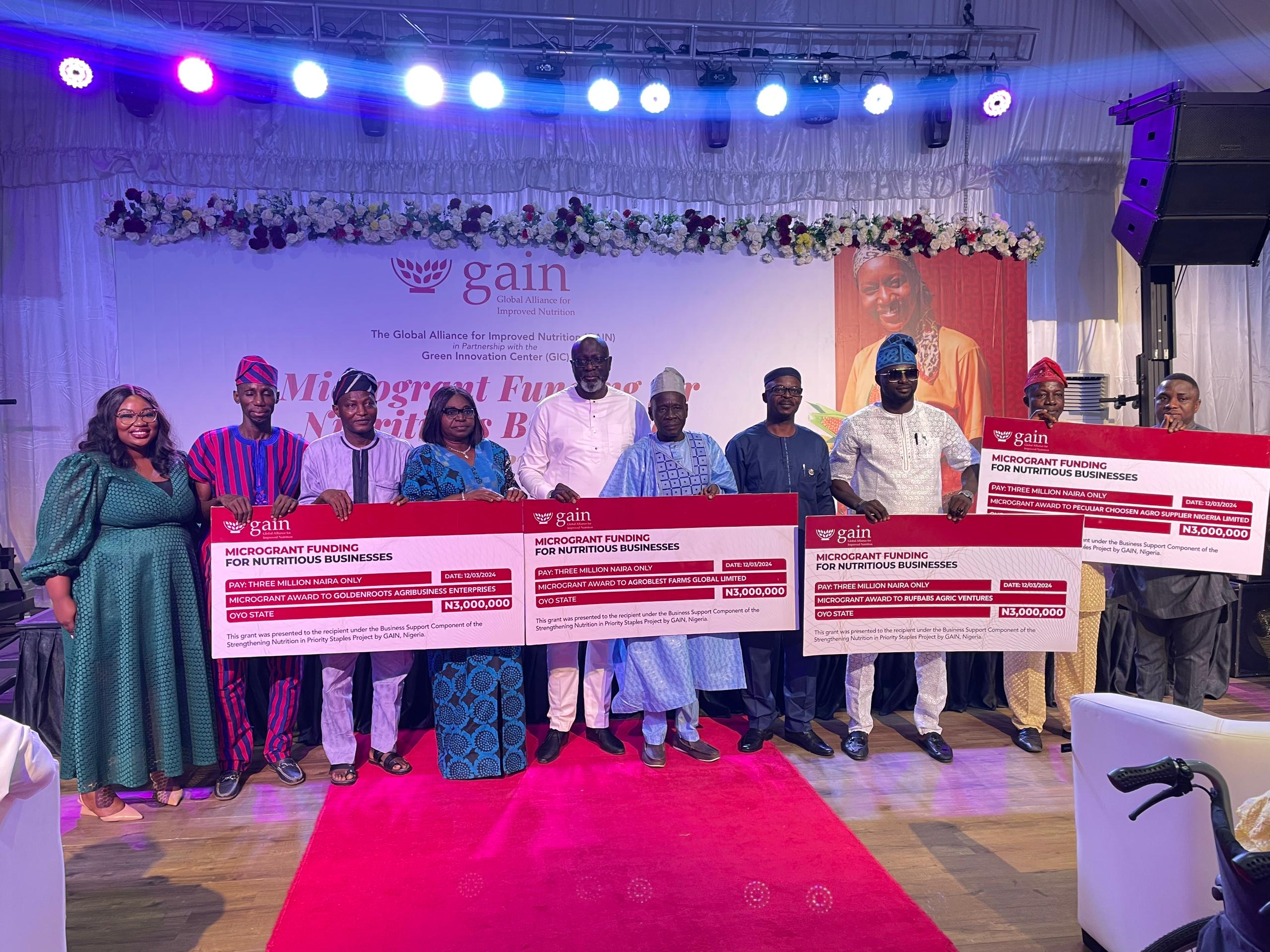
***Small, Medium farm business enterprises to improve nutrition, food security
States and Local governmets have been charged to give support to the smallholder farmers, other agric related small and medium enterprises to improve nutrition and food security.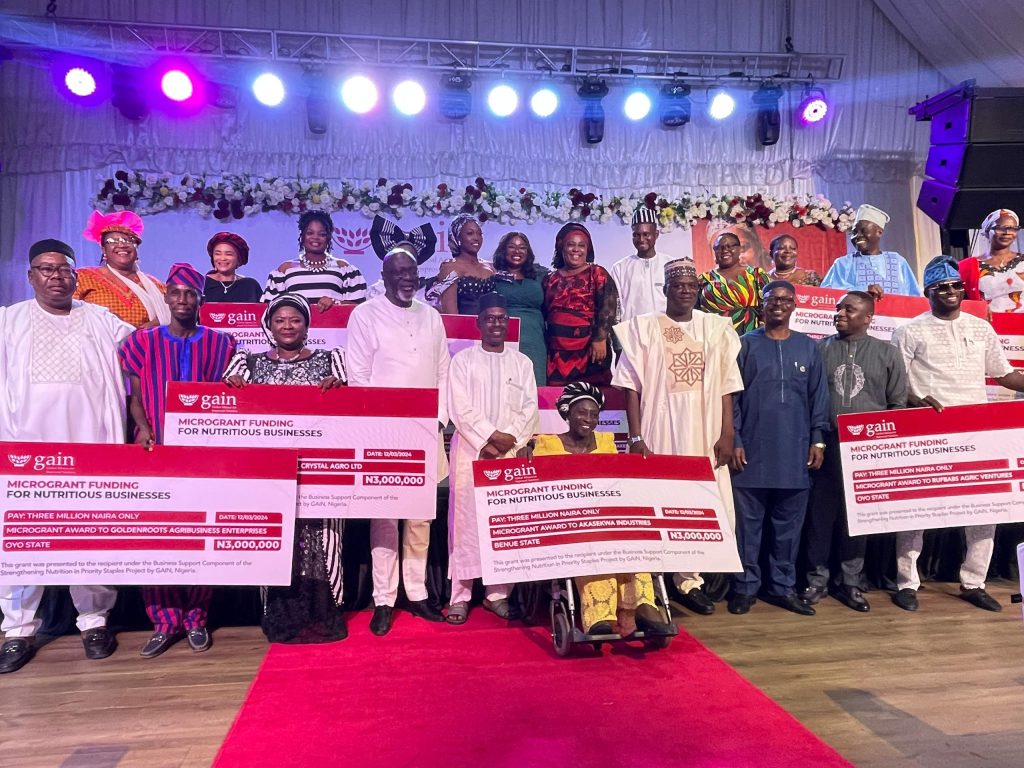
The National President of All Farmers Association of Nigeria (AFAN), Architect Kabiru Ibrahim and the country Director of Global Alliance for Improved Nutrition (GAIN), Micheal Ojo, gave the charge recently at the 2023 Microgrant funding for nutritious Business Award Ceremony for 16 businesses in Abuja.
The grants were awarded at N3m each to 16 small businesses by Global Alliance for improved Nutrition (GAIN) in Benue, Nasarawa, Jaduna and Oyo States.
Ojo in his keynote address, said the gathering is to celebrate Small and Medium enterprises.
He said, the more the smallholders farmer in the country are empowered and encouraged with support that provude them access to expanding their production and connecting to markets, what they produce would not come to waste that is the big part of the solution to insecurity.
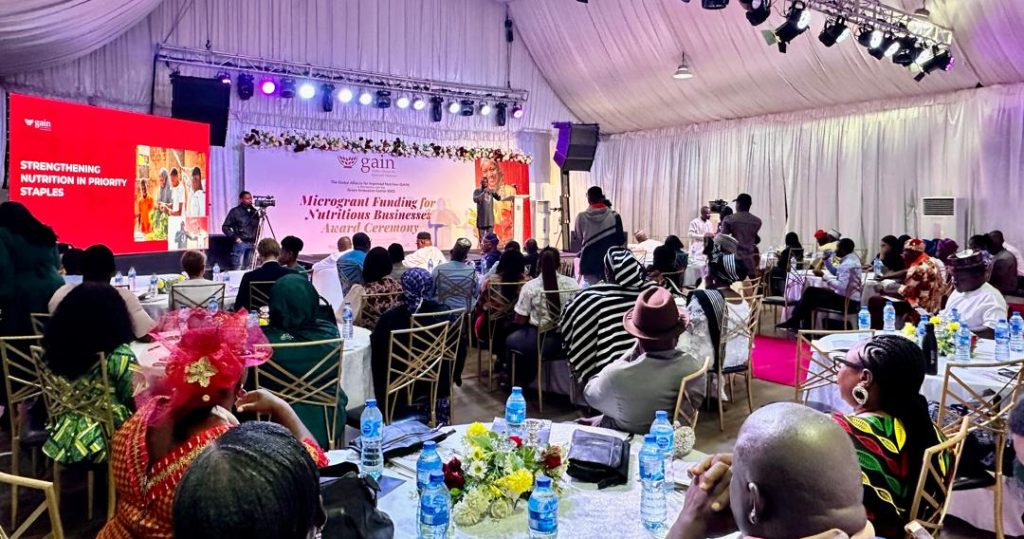
“We have been supporting many of them on this project that we call Strengthening Nutrition in Priority Staples over the past couple of years and the project is aiming to help those who are working in specific value chain, VitaminA maize, VitaminA cassava, Orange sweet potato to help them to produce more and to process what they are producing so that they can have these food Items on the market.
“The point of this is to help to improve the nutritional quality of our food and diversify at times and we all as Nigerians consume a lot of Cassava, a lot of Maize, we consume a lot of potato but we now have opportunity to actually move those foods away from analog varieties to more nutritious varieties.
“All of these new varieties have very high levels of Vitamin A. Vitamin A deficiency is prevalent in our population and it is a very important micronutrient for health and wellbeing for children, for mothers but all of us.
“So this is a very important development. What we are doing with the microgrant that we are providing as support to these businesses is recognizing that many of them face the challenge of finding access to finance to grow the small and medium enterprises.
“We all know how difficult it is to access funding in Nigeria. This helps to take their businesses from whatever level they are to the next level and it can be used for improving their processing, it can be used for packaging or it can be used for assuring the quality of their products.
“It can be used for marketing of their products. It cand be used for so many things and we will work with the businesses to identify the best ways for them to use this micro grant fund.
“For each of the 16 businesses that we are awarding today, we are giving each one of them N3m. For a small business that is a substantial investment to support them to be able to invest in their businesses and to scale up.what they are doing.
“So that is why we are here and I am really pleased that we have been able to bring everybody together and I am thankful to our partners in the four States where we are working, in Kaduna, state, in Nassarawa State, Benue State and Oyo State. These guys are here, the partners are here. I am really pleased
“Currently we have funding to work in the four States but there is still a lot of work to do, we have just done over half way through the project. We are currently working and identifying more businesses in those four States.
“Yes we are looking for additional funding to work across other States but that will depend on new funding. It doesn’t even have to be through GAIN, we are showing the governments we are working with businesses that are in the State you know pouring in State resources doing what we have done to scale it up.
“We bring very small investment but the real investments is going to come from State and also from the private sector. 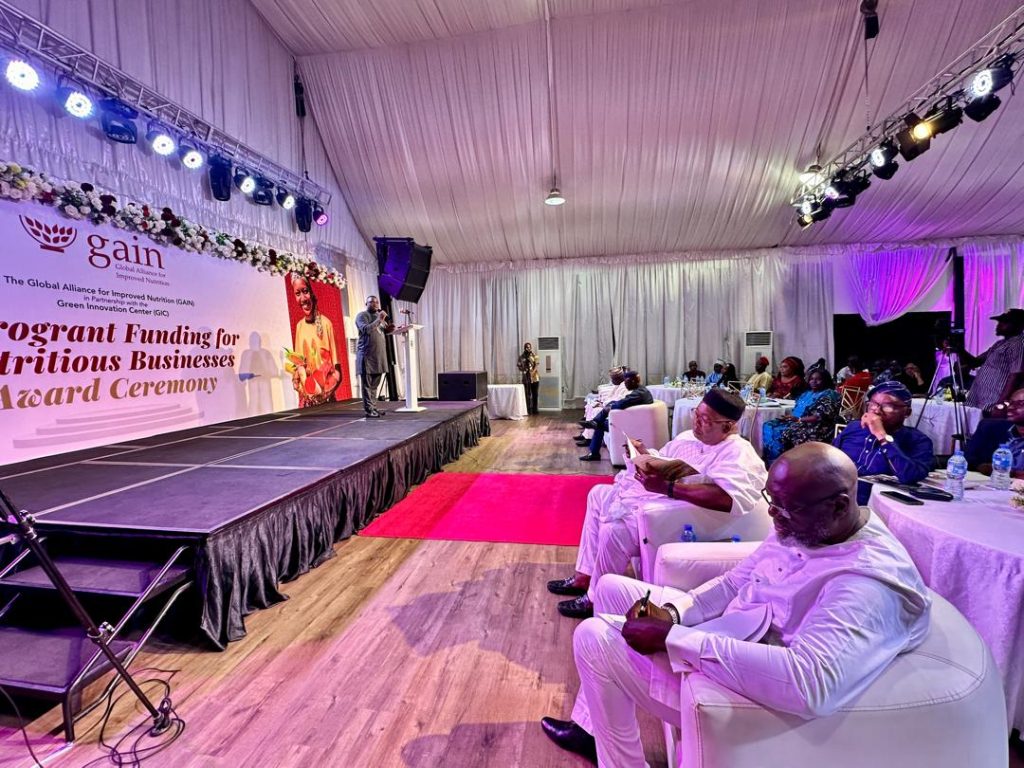
“So we are hoping that people will look at what we have done, they copy what we have done, they replicate it and expand it so that we can have increased and improved access to nutrition for the country.
“We have worked with at least 4000 food processors across the States. We are working with about 8000 farming households so that is the scale we were able to reach with the project.
“We are not able to solve insecurity unfortunately. Insecurity also stems from the lack of access to livelihood.
Architect Ibrahim, said, the effort to do Nutrition security is complementary to food security as a matter of fact.
“We have been championing the call for farmers to add value to what they produce so that they will get more. The work of GAIN is very apt, it is making our farmers more prosperous and making the food security question more seamlessly achieved.
“Food security actually means eating what you want at the time that you want and it is affordable to you and it is nutritiously balanced.
“Any effort to fortify the conventional crops to make them more valuable nutritiously is a welcome development and Nigeria will only be food secure if it is nutriciously secured because the children will not be stunted.
“I think it is a very good effort and I am glad that I came to witness here. This is what every farmer should strive to do, add value to what the produce because if you sell whatever you produced in its primary form you get nothing.
“It is value addition that took those countries we call the first world to where they sre today. We have the land, we have the manpower, we have everything here but since we don’t add value to whatever we produce, we are always at the losing end.
“For me, my experience spans back to two decades in this business because I don’t believe in donor funding because definitely you to part with that which is actually yours that supposed to be secret.
“You have to ask the motivation for the donation first. To that effect I am saying that we should look inward.
“The State and local Government that is where agriculture take place, they should be more into this than leaving it to the National.
“We should go back to the States and local government to produce and then we learn to add value from there. “Agric business is the thing that would move to food security in the sense that, when you produce something and you get money and the villagers see that you are prosperous they will take up what you so and that way Nigeria will become food sufficient and then we attain food security.
“This is what happens in the first world, agriculture business is the motivation that made 55,000 people in the Neitherlands to have income second only to the United States of America.
“The income in agriculture in the Netherlands is what make the country work and in the country everybody is busy because they are adding value to what they produce and they are doing agribusiness and they are going into everywhere in the world to sell what they have
“The governor’s have started buying into it, a number of them have visited the Minister of Agric lately and on Monday I was in Minna with the Presid2nt where they launched 1000 tractors, 3000 water pumps.
“That governor is doing well, I call him the most farmer friendly governor of this country. All other governors should model after him. Four governors were at the ocasion, two from the central.”
Agriculture
Food Security: FG Inaugurates Agribusiness incubation centre in FUL
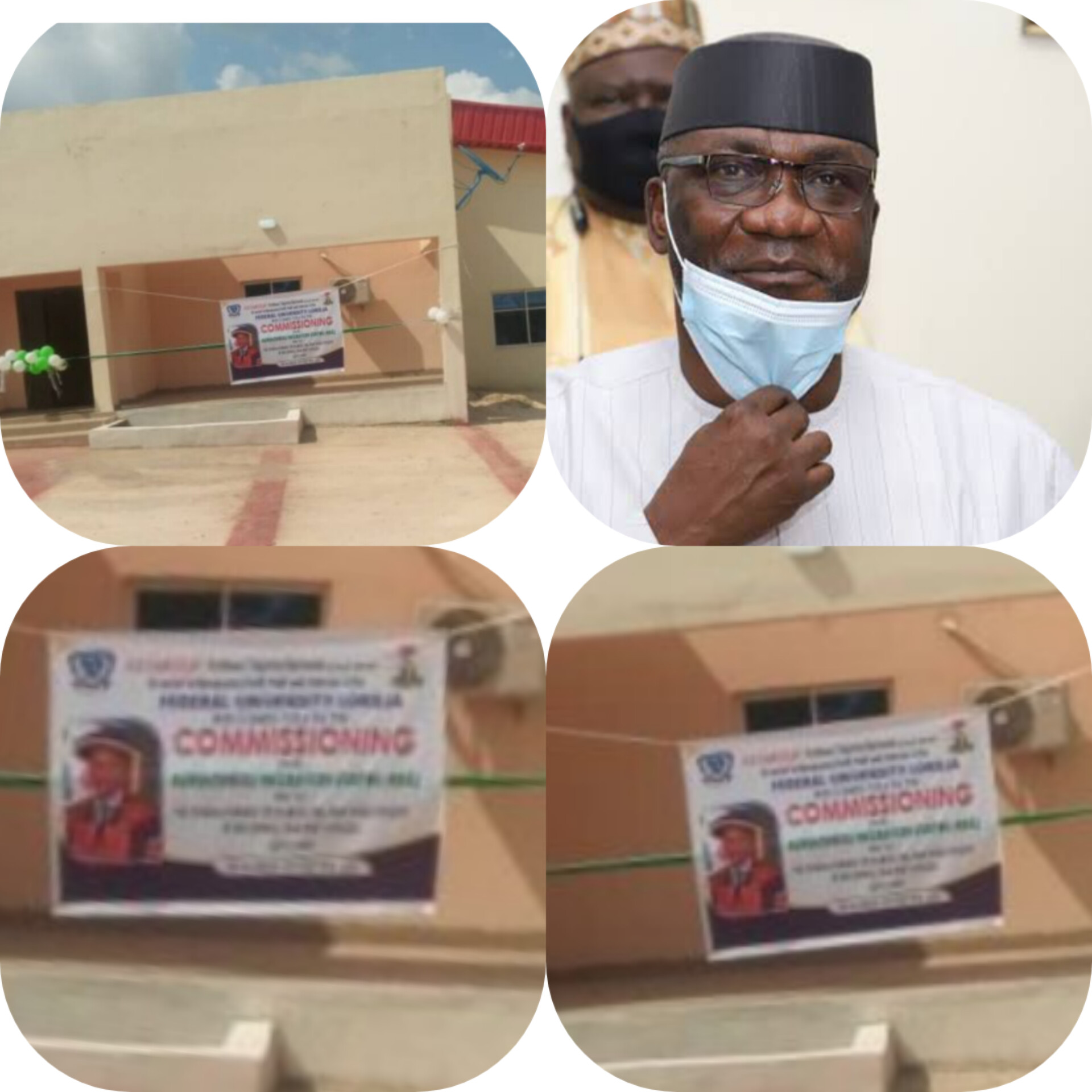
By Friday Idachaba, Lokoja.
The Federal Ministry of Agriculture and Food Security, has inaugurated an Agribusiness Incubation Centre (ABIC) in Federal University Lokoja (FUL), in Kogi towards boosting food production and security in Nigeria.
Dr Ernest Umakhihe, Permanent Secretary of the Ministry, who Inaugurated the centre on Saturday in Lokoja as part of the 6th and 7th Convocation ceremony of the Federal University Lokoja.
Umakhihe said that the Center was focused at enhancing production capacity, value addition, quality control and standards and opening access to local and international markets for the nation’s agricultural produce.
“The incubation centre is being established as a Special Centre of Excellence to support and promote food security in Nigeria, and to support youth and women empowerment as well as promote employment generation, wealth creation and poverty reduction.
“This will be through the development of viable agribusiness and entrepreneurship skills in different Agricultural Value Chains across the country.
“The focus of the centre include; enhancing production capacity, value addition, quality control and standards, and opening access to local and international markets for our agricultural produce.
“The project is aimed at facilitating and attracting investments into the agricultural sector, ensuring survival and sustainability of agri-based businesses and increasing domestic food production and exports, ” he said.
Umakhihe said that the centre would serve as practical knowledge hub where best practical skills, processes and inputs could be acquired on particular commodities.
According to him, the centres will also produce generation of young successor farmers and Agricultural entrepreneurs who can adopt new technologies and innovations across the segments of commodities enterprise/value chain of production, processing, storage and marketing.
“The centre is equipped to provide business basics through comprehensive training programmes along commodity Value chains and business start-ups including access to bank loans and other funds and guarantee programmes.
“The centre will support Market research, linkage to strategic partners, access to investors and the development of business plans and business networking etc”, he added.
The Permanent Secretary expressed satisfaction and appreciated the support and cooperation of the Vice Chancellor, Prof. Olayemi Akinwumi, the Academic and Management of FUL for the successful completion of the centre.
He also expressed the hope that the university would exploit the opportunities to be created by the Center and prove its support as a formidable institution in the concerted efforts of the government to grow the nation’s economy using the agricultural sector.
Responding, the FUL Vice Chancellor, Prof. Olayemi Akinwumi commended the Federal Government for setting up the centre in the University.
Akinwumi pledged to ensure that the institution would make good use of the opportunity offered to it to train the students in to becoming big time agriculturalists that would contribute to the nation’s food production and security.
The Nigerian Pilot reports that the Permanent Secretary also commissioned a six-kilometer road constructed by the Ministry from the university’s Zoo to Lokoja-Okene Road. (Ends)
-

 Crime1 year ago
Crime1 year agoPolice nabs Killer of Varsity Lecturer in Niger
-

 News1 year ago
News1 year agoFCT-IRS tells socialite Aisha Achimugu not to forget to file her annual returns
-

 Appointment2 years ago
Appointment2 years agoTinubu names El-Rufai, Tope Fasua, others in New appointments
-

 News From Kogi1 year ago
News From Kogi1 year agoINEC cancells election in 67 polling units in Ogori-Magongo in Kogi
-

 News From Kogi2 years ago
News From Kogi2 years agoEchocho Challenges Tribunal Judgment ordering rerun in 94 polling units
-

 News2 years ago
News2 years agoIPOB: Simon Ekpa gives reason for seperatists clamour for Biafra
-

 Metro1 year ago
Metro1 year ago‘Listing Simon Ekpa among wanted persons by Nigeria military is rascality, intimidation’
-

 News1 year ago
News1 year agoKingmakers of Igu/ Koton-Karfe dare Bello, urge him to reverse deposition of Ohimege-Igu
